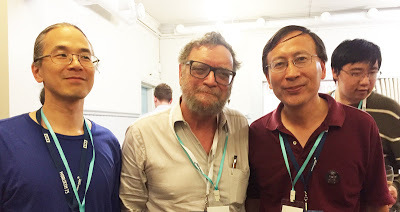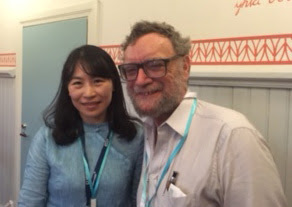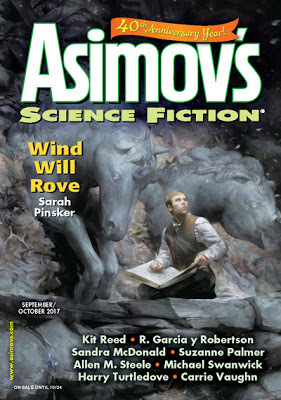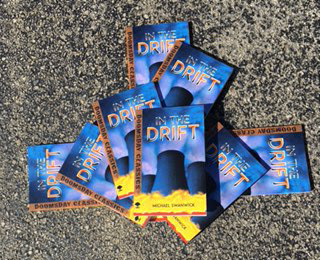Michael Swanwick's Blog, page 96
September 21, 2017
Gone Birding
.Li Bai long ago wrote a poem, in Chinese of course, that can be translated thusly:
Because water returns, though we cut it with swords,
And sorrow returns, though we drown it in wine,
Because the world can in no way conform to our desires,
Today,I will let down my hair
And go fishing.
Wise words from everybody's favorite drunken savant. So today I'm going birding. If you behave yourselves while I'm away, maybe I'll share a photograph or two.
*
Because water returns, though we cut it with swords,
And sorrow returns, though we drown it in wine,
Because the world can in no way conform to our desires,
Today,I will let down my hair
And go fishing.
Wise words from everybody's favorite drunken savant. So today I'm going birding. If you behave yourselves while I'm away, maybe I'll share a photograph or two.
*
Published on September 21, 2017 06:07
September 14, 2017
China in Helsinki -- Part 2
.

Chinese science fiction writers, editors, and other professionals were all over Worldcon 75. I had a number of conversations with old friends and new throughout the convention. Many of which occurred during the Storycom party on Saturday night.
I met and talked with any number of writers there, including Gu Shu, whose story "Chimera," appeared last year in Clarkesworld and Bao Shu, another Clarkesworld alumnus, whose story "What Has Passed Shall in Kinder Light Appear" was published last year in F&SF and reprinted in Paula Guran's The Year's Best Science Fiction and Fantasy Novellas and Allan Kanter's The Year's Top Short Science Fiction Novels audio book. I also had the opportunity to connect with author Ruhan Zhao and to meet Feng Zhang, introduced to me as "the Chinese John Clute." Among, as they say, many others.
The conversations were good. I learned a lot about the rapidly evolving state of science fiction in China. My friend Haihong Zhao and I discussed Cixin Liu's Three Body Problem trilogy at some length -- books which we both admire greatly. I learned much that should prove useful to know.
And if I could share with you only one thing I learned about the Chinese SF community, what would it be? Well...
"You guys are all so supportive of each other!" an actress I know once remarked about the science fiction community in the US. "Actors aren't like that at all."
The Chinese science fiction community is like that too, and possibly more so, because contemporary science fiction is relatively new and needs all the support it can get. I had heard beforewhat a close-knit community it is. But now I could see it in action: in the way they treated each other, in how the bigger-name writers were careful to introduce the newer ones, and how everybody was careful not to hog too much of any conversation. These are good people and they're working to create an important body of literature. I couldn't help thinking the world of them.
Above: Ted Chiang, me, and Ruhan Zhao. Photograph by Haihong Zhao. Did I mention what a terrific writer Haihong is?
*

Chinese science fiction writers, editors, and other professionals were all over Worldcon 75. I had a number of conversations with old friends and new throughout the convention. Many of which occurred during the Storycom party on Saturday night.
I met and talked with any number of writers there, including Gu Shu, whose story "Chimera," appeared last year in Clarkesworld and Bao Shu, another Clarkesworld alumnus, whose story "What Has Passed Shall in Kinder Light Appear" was published last year in F&SF and reprinted in Paula Guran's The Year's Best Science Fiction and Fantasy Novellas and Allan Kanter's The Year's Top Short Science Fiction Novels audio book. I also had the opportunity to connect with author Ruhan Zhao and to meet Feng Zhang, introduced to me as "the Chinese John Clute." Among, as they say, many others.
The conversations were good. I learned a lot about the rapidly evolving state of science fiction in China. My friend Haihong Zhao and I discussed Cixin Liu's Three Body Problem trilogy at some length -- books which we both admire greatly. I learned much that should prove useful to know.
And if I could share with you only one thing I learned about the Chinese SF community, what would it be? Well...
"You guys are all so supportive of each other!" an actress I know once remarked about the science fiction community in the US. "Actors aren't like that at all."
The Chinese science fiction community is like that too, and possibly more so, because contemporary science fiction is relatively new and needs all the support it can get. I had heard beforewhat a close-knit community it is. But now I could see it in action: in the way they treated each other, in how the bigger-name writers were careful to introduce the newer ones, and how everybody was careful not to hog too much of any conversation. These are good people and they're working to create an important body of literature. I couldn't help thinking the world of them.
Above: Ted Chiang, me, and Ruhan Zhao. Photograph by Haihong Zhao. Did I mention what a terrific writer Haihong is?
*
Published on September 14, 2017 15:08
September 11, 2017
China in Helsinki -- Part 1
.

I wasn’t taking notes and I’m wary of unintentionally misquoting Verso, so here’s something very similar to what I heard, which he said in an interview on The Earthian Hivemind : “…as a reader, I was tired of going to Italian bookstores and finding always (or mostly) the same kind of story, written by a middle-class, English-speaking, white-man (presumably Christian, Heterosexual and living in the US or the UK). I was missing a huge part of the representativeness of the ‘real’ world, some kind of ‘literary biodiversity’ which in other genres – as paradoxically as it might seem – is not so extreme.”
Exactly! Literary diversity is to be valued not for abstract reasons but because it enriches us. It gives us new insights, new perspectives, and most importantly new ideas. Which is, after all, what this field is all about.
This is why it was so exciting to see a large and active Chinese presence at the Worldcon. There were at least four distinct groups of which I was aware:
There was Science Fiction World, the publisher of China’s oldest (and the world’s most-read) science fiction magazine (also called Science Fiction World ), as well as a great number of SF books, both original and in translation. In addition to their core activities, they were manning a booth in the trade hall (dealers’ room) to promote the Fourth China International SF Conference, which will be held in Chengdu this November.
Then there was Douban Read, the publishing arm of a social networking service. At least two of their people were meeting with science fiction writers and editors in order to expand their presence in the SF market.
The Future Affairs Administration is or began as, if I got this right, a consortium of Beijing-area fans, dedicated to the promotion and development of Chinese science fiction. In a South China Morning Post with the Future Affairs Administration's founder Ji Shaoting, the paper characterized their mission as "a start-up in Beijing that wants to ‘administer the future’ by being an incubator for sci-fi talent and integrating resources through hosting seminars and connecting writers with scientists." They are currently getting into publishing in a big way.
Finally, but certainly not least, there was Storycom, which I was told exists chiefly to connect Chinese science fiction writers to the Chinese movie industry. But they are engaged in other activities as well, most notably the Shimmer Program. A partnership between the Shimmer Program and Clarkesworld has been bringing a Chinese science fiction story a month to Anglophone readers for twenty or more months. We have good reason to be grateful to them.
So there was a great deal going on. Most of which, of course, went right over my head. My connection with China is very slim. I've had some stories and novels published there, and I have Chinese friends, but to be honest, I'm a spear-carrier in this epic.
But I'll say a few words more about on this topic in Wednesday's blog.
You can read The Earthian Hivemind’s interview with Franceso Verso here.
You can read the interview with Ji Shaoting here.
And of course, you can always find the indispensable Clarkesworld here.
Above: That's me with my friend Haihong Zhao, an extremely good writer and winner of several Chinese Nebula Awards.
*

I wasn’t taking notes and I’m wary of unintentionally misquoting Verso, so here’s something very similar to what I heard, which he said in an interview on The Earthian Hivemind : “…as a reader, I was tired of going to Italian bookstores and finding always (or mostly) the same kind of story, written by a middle-class, English-speaking, white-man (presumably Christian, Heterosexual and living in the US or the UK). I was missing a huge part of the representativeness of the ‘real’ world, some kind of ‘literary biodiversity’ which in other genres – as paradoxically as it might seem – is not so extreme.”
Exactly! Literary diversity is to be valued not for abstract reasons but because it enriches us. It gives us new insights, new perspectives, and most importantly new ideas. Which is, after all, what this field is all about.
This is why it was so exciting to see a large and active Chinese presence at the Worldcon. There were at least four distinct groups of which I was aware:
There was Science Fiction World, the publisher of China’s oldest (and the world’s most-read) science fiction magazine (also called Science Fiction World ), as well as a great number of SF books, both original and in translation. In addition to their core activities, they were manning a booth in the trade hall (dealers’ room) to promote the Fourth China International SF Conference, which will be held in Chengdu this November.
Then there was Douban Read, the publishing arm of a social networking service. At least two of their people were meeting with science fiction writers and editors in order to expand their presence in the SF market.
The Future Affairs Administration is or began as, if I got this right, a consortium of Beijing-area fans, dedicated to the promotion and development of Chinese science fiction. In a South China Morning Post with the Future Affairs Administration's founder Ji Shaoting, the paper characterized their mission as "a start-up in Beijing that wants to ‘administer the future’ by being an incubator for sci-fi talent and integrating resources through hosting seminars and connecting writers with scientists." They are currently getting into publishing in a big way.
Finally, but certainly not least, there was Storycom, which I was told exists chiefly to connect Chinese science fiction writers to the Chinese movie industry. But they are engaged in other activities as well, most notably the Shimmer Program. A partnership between the Shimmer Program and Clarkesworld has been bringing a Chinese science fiction story a month to Anglophone readers for twenty or more months. We have good reason to be grateful to them.
So there was a great deal going on. Most of which, of course, went right over my head. My connection with China is very slim. I've had some stories and novels published there, and I have Chinese friends, but to be honest, I'm a spear-carrier in this epic.
But I'll say a few words more about on this topic in Wednesday's blog.
You can read The Earthian Hivemind’s interview with Franceso Verso here.
You can read the interview with Ji Shaoting here.
And of course, you can always find the indispensable Clarkesworld here.
Above: That's me with my friend Haihong Zhao, an extremely good writer and winner of several Chinese Nebula Awards.
*
Published on September 11, 2017 08:55
September 7, 2017
A Writer's Pie Safe
.

I just now finished a story and placed it in the pie safe. Which is a tool almost as necessary to a writer as a pen or a level desk to place heaps of paper upon.
A literal pie safe is a piece of furniture used before refrigeration to store pies and other foodstuffs. It often has tin inserts decorated with punched holes to provide ventilation while keeping out flies and other vermin. But I, of course, am speaking metaphorically.
A metaphorical pie safe is the discipline needed to set aside a finished story for a few weeks and not think about it. The story doesn't stay in the pie safe long enough to grow stale -- just long enough for the writer to fall out of love with his or her words. Then it gets taken out again and reread. Preferably out loud.
You'd be amazed at the mistakes that leap out at you when you do that. A quick revision later, however, the story is ready to submitted to a paying market. And resubmitted again and again until it is bought or you die.
Whichever comes first.
And a word of caution...
No writing advice works for all writers. Depending on what kind you are, the pie safe might not be suitable for you. It is definitely contraindicated for writers who, given the chance, will take the opportunity to lock the story away, never to be reread, revised, or submitted to a paying market. You know who you are.
Above: A very nicely made pie safe I found at The Wood Whisperer. You can visit that page here.
*

I just now finished a story and placed it in the pie safe. Which is a tool almost as necessary to a writer as a pen or a level desk to place heaps of paper upon.
A literal pie safe is a piece of furniture used before refrigeration to store pies and other foodstuffs. It often has tin inserts decorated with punched holes to provide ventilation while keeping out flies and other vermin. But I, of course, am speaking metaphorically.
A metaphorical pie safe is the discipline needed to set aside a finished story for a few weeks and not think about it. The story doesn't stay in the pie safe long enough to grow stale -- just long enough for the writer to fall out of love with his or her words. Then it gets taken out again and reread. Preferably out loud.
You'd be amazed at the mistakes that leap out at you when you do that. A quick revision later, however, the story is ready to submitted to a paying market. And resubmitted again and again until it is bought or you die.
Whichever comes first.
And a word of caution...
No writing advice works for all writers. Depending on what kind you are, the pie safe might not be suitable for you. It is definitely contraindicated for writers who, given the chance, will take the opportunity to lock the story away, never to be reread, revised, or submitted to a paying market. You know who you are.
Above: A very nicely made pie safe I found at The Wood Whisperer. You can visit that page here.
*
Published on September 07, 2017 07:34
September 1, 2017
A Family Visit
.

It used to be, Marianne and I had to drive three hundred miles to visit her parents. Today, alas, it takes less than a hundred.
Yesterday, Marianne and I drove to the military cemetery in Ft. Indiantown Gap to visit her father, William Christian Porter and mother Mary Ann Porter. The cemetery is beautiful and quiet and, the stones being all of a size, there is a touching democracy of death.
Death is something the military forces understand well.I've been to a lot of military funerals and they're always deeply moving.
Marianne's mother's remains were interred some while ago, though. We just came to visit and to see that the stone had been carved in accord with her wishes. As it was. It had taken some argument with the VA officials, but they finally agreed to let her have her way: If you look closely at the stone, you'll see that under her husband's name are his dates of birth and death, but under hers only the date of death.
Her age was nothing that a woman of her generation would have made public.
*

It used to be, Marianne and I had to drive three hundred miles to visit her parents. Today, alas, it takes less than a hundred.
Yesterday, Marianne and I drove to the military cemetery in Ft. Indiantown Gap to visit her father, William Christian Porter and mother Mary Ann Porter. The cemetery is beautiful and quiet and, the stones being all of a size, there is a touching democracy of death.
Death is something the military forces understand well.I've been to a lot of military funerals and they're always deeply moving.
Marianne's mother's remains were interred some while ago, though. We just came to visit and to see that the stone had been carved in accord with her wishes. As it was. It had taken some argument with the VA officials, but they finally agreed to let her have her way: If you look closely at the stone, you'll see that under her husband's name are his dates of birth and death, but under hers only the date of death.
Her age was nothing that a woman of her generation would have made public.
*
Published on September 01, 2017 12:27
August 30, 2017
Two Stories On The Stands At One Time!
.

Look what came in the mail yesterday!
The September/October issue of Asimov's Science Fiction contains my novelette "Universe Box." Which, combined with the fact that the current issue of F&SF contains my short story "Starlight Express," (as mentioned in last Thursday's blog post) means this is a pretty darned good month for me.
"Universe Box" was originally published in an edition of thirteen as part of an assemblage by Dragonstairs Press. A project which, incidentally, sold out in four minutes flat.
So what's the story about? It's about cramming as much fun as i could in ten thousand words. A boring young man is about to propose marriage to the love of his life when Trickster drops by with a cigar box containing the biggest, most valuable theft of his career. Dan Scratch shows up to make a deal. The Eternal Minion has a face-down with the Black Lama. And there are giraffe wranglers!
Also, snowflakes.
Oh, and that reminds me: Spoiler Alert. I probably should have said that sometime earlier.
You can visit the Dragonstairs Press site here. Scroll down to see photos and a short film of the box. Linger to admire the many publications that, with one or two fleeting exceptions, are no longer available for sale.
*

Look what came in the mail yesterday!
The September/October issue of Asimov's Science Fiction contains my novelette "Universe Box." Which, combined with the fact that the current issue of F&SF contains my short story "Starlight Express," (as mentioned in last Thursday's blog post) means this is a pretty darned good month for me.
"Universe Box" was originally published in an edition of thirteen as part of an assemblage by Dragonstairs Press. A project which, incidentally, sold out in four minutes flat.
So what's the story about? It's about cramming as much fun as i could in ten thousand words. A boring young man is about to propose marriage to the love of his life when Trickster drops by with a cigar box containing the biggest, most valuable theft of his career. Dan Scratch shows up to make a deal. The Eternal Minion has a face-down with the Black Lama. And there are giraffe wranglers!
Also, snowflakes.
Oh, and that reminds me: Spoiler Alert. I probably should have said that sometime earlier.
You can visit the Dragonstairs Press site here. Scroll down to see photos and a short film of the box. Linger to admire the many publications that, with one or two fleeting exceptions, are no longer available for sale.
*
Published on August 30, 2017 13:00
August 25, 2017
In The Drift and Back In Print
.

Look what came in the mail yesterday! Twenty-eight years after its last English-language publication, In the Drift is back in print.
My first novel was a fix-up made up of "Mummer Kiss," "Boneseeker," and "Marrow Death," with two intersticial sections. When I submitted the manuscript, the novel was titled The Drift. The publisher didn't like the title and changed it to In the Drift.
Terrible title.
When I asked why, it was explained that it sounded like a horror novel. Which was both true and fair. Unluckily, the editor charged with retitling the book had a tin ear. Even more unluckily, I couldn't think of a better title until, the following year, I received copies of the French translation, Le Baiser du Masque. I got out my French dictionary to find out what the title meant and discovered that it was Mummer Kiss.
Smek!
The perfect title for the novel had been staring me in the face all the time.
Now Dover Publications has reissued my novel, part of a line of SF disaster novels, I believe. If you're curious, you can go to their website here and look around.
And having neglected to say a word about the contents...
In the Drift is set in an alternative future about a hundred years after the Three Mile Island reactor went to full meltdown. Most of Pennsylvania is unlivable and an impoverished Philadelphia is ruled by the Mummers. Hence the grim story titles.
And just in case the word has gone out of style...
Smek!, by the way, is the sound of one's palm hitting one's forehead.
*

Look what came in the mail yesterday! Twenty-eight years after its last English-language publication, In the Drift is back in print.
My first novel was a fix-up made up of "Mummer Kiss," "Boneseeker," and "Marrow Death," with two intersticial sections. When I submitted the manuscript, the novel was titled The Drift. The publisher didn't like the title and changed it to In the Drift.
Terrible title.
When I asked why, it was explained that it sounded like a horror novel. Which was both true and fair. Unluckily, the editor charged with retitling the book had a tin ear. Even more unluckily, I couldn't think of a better title until, the following year, I received copies of the French translation, Le Baiser du Masque. I got out my French dictionary to find out what the title meant and discovered that it was Mummer Kiss.
Smek!
The perfect title for the novel had been staring me in the face all the time.
Now Dover Publications has reissued my novel, part of a line of SF disaster novels, I believe. If you're curious, you can go to their website here and look around.
And having neglected to say a word about the contents...
In the Drift is set in an alternative future about a hundred years after the Three Mile Island reactor went to full meltdown. Most of Pennsylvania is unlivable and an impoverished Philadelphia is ruled by the Mummers. Hence the grim story titles.
And just in case the word has gone out of style...
Smek!, by the way, is the sound of one's palm hitting one's forehead.
*
Published on August 25, 2017 08:41
August 24, 2017
Starlight Express by Maurizio Manzieri
.

"All of the drawbacks of being a writer are financial." I said that in a Liars Club podcast. Those are true words and I'm sticking to 'em. But the perks and advantages are manifold.
One of the best of these is getting a beautiful --and perfectly apt -- cover illustration for a novel or story. As has just happened to me. My latest story, "Starlight Express," appears in the newest issue of F&SF and look at the art that was commissioned for the cover.
The story is set in the ancient city of Roma, far in the future. Flaminio, a young nobody who works as a water carrier, happens to be present when a beautiful woman climbs down the steps from the Astrovia, the matter transmitter that once enabled human passage between star systems. Only that's impossible because the Astrovia has been broken for many thousands of years.
Here's what Maurizio Manzieri, the artist, had to work from when he painted the woman, Szette:
All of which you can see in Manzieri's painting. Which also establishes the setting of Rome, includes a ghostly Astrovia, and establishes Szette's possible extraterrestrial origin with a scattering of stars and planets and the earring (jewelry plays a crucial part in the story) with the Milky Way pendant from one lobe.
You can see why I'm so happy with Manzieri's painting. But it's even better than you know, because he also painted Szette's character into her face. If you read the story and then look at the cover again, you'll see what I mean. The gist, the essence of "Starlight Express" is captured in her expression.
But if you want to know what I meant by that, you'll just have to read the story. In the September/October issue of The Magazine of Fantasy and Science Fiction. You can buy it on the news stand soon.
Or you could subscribe. I do.
The magazine's website, for those of you who can take a hint, can be found here.
And if you're a gonnabe writer...
The quotation above, and an earlier reference to the fact that Szette's gown "slid across her body with simple grace," are the totality of what I wrote about her appearance. Not a word more was needed.
And in fact, because Szette's beauty was necessary for the story, I spent more time describing her than I usually do for a character. Because, really, the reader is on your side. They're perfectly willing to do half the imagining for you.
*

"All of the drawbacks of being a writer are financial." I said that in a Liars Club podcast. Those are true words and I'm sticking to 'em. But the perks and advantages are manifold.
One of the best of these is getting a beautiful --and perfectly apt -- cover illustration for a novel or story. As has just happened to me. My latest story, "Starlight Express," appears in the newest issue of F&SF and look at the art that was commissioned for the cover.
The story is set in the ancient city of Roma, far in the future. Flaminio, a young nobody who works as a water carrier, happens to be present when a beautiful woman climbs down the steps from the Astrovia, the matter transmitter that once enabled human passage between star systems. Only that's impossible because the Astrovia has been broken for many thousands of years.
Here's what Maurizio Manzieri, the artist, had to work from when he painted the woman, Szette:
All of which you can see in Manzieri's painting. Which also establishes the setting of Rome, includes a ghostly Astrovia, and establishes Szette's possible extraterrestrial origin with a scattering of stars and planets and the earring (jewelry plays a crucial part in the story) with the Milky Way pendant from one lobe.
You can see why I'm so happy with Manzieri's painting. But it's even better than you know, because he also painted Szette's character into her face. If you read the story and then look at the cover again, you'll see what I mean. The gist, the essence of "Starlight Express" is captured in her expression.
But if you want to know what I meant by that, you'll just have to read the story. In the September/October issue of The Magazine of Fantasy and Science Fiction. You can buy it on the news stand soon.
Or you could subscribe. I do.
The magazine's website, for those of you who can take a hint, can be found here.
And if you're a gonnabe writer...
The quotation above, and an earlier reference to the fact that Szette's gown "slid across her body with simple grace," are the totality of what I wrote about her appearance. Not a word more was needed.
And in fact, because Szette's beauty was necessary for the story, I spent more time describing her than I usually do for a character. Because, really, the reader is on your side. They're perfectly willing to do half the imagining for you.
*
Published on August 24, 2017 08:21
August 18, 2017
J. K. Klein: Some Achieve Greatness...
.

In 2012, Gene Wolfe was inducted into the Chicago Hall of Literary Fame and I flew to Chicago to be a small part of that moment. The morning of the event, the late David Hartwell called me up and said, "I'm in Fred Pohl's kitchen, helping him sort through Jay Kay Klein's photos for pictures he can use to update The Way the Future Was. Wanna join us?"
Did I?!
Thus began a very pleasant several hours, a story which I will someday regale you with. But not today. Today I mention it because UC Riverside has announced that they've digitized the nearly six thousand photographs Jay Kay Klein took of the great, near-great, and perfectly obscure of science fiction fandom and prodom over the course of many decades.
But I hear you ask: Who was Jay Kay Klein?
The answer is: An inspiration to ordinary people everywhere. Jay kay was not inherently an interesting person. He wasn't a writer or a particularly articulate conversationalist. He certainly wasn't a fashion icon. He wore white shirts with slacks held up high on the waist by a thin belt. So far as I could tell (and I admit that I could be wrong), there was no particular reason to pay any attention to him. He was unimportant.
So he made himself important.
For decade after decade, he attended every convention he could, bringing along his trusty camera. Jay Kay wasn't a particularly gifted photographer. But he could take a clear shot of a human being, in focus. And he labeled every photograph with name, date, and convention.
So in J. K. Klein's photos, we have a visual history of everybody who was anybody in science fiction over many decades. You can watch the young Harlan Ellison grow old in them. You can find pix of people whom everybody but you has forgotten. All the greats of the time are present. Taken together, the photos are a treasure.
And a quintessentially ordinary man made them.
At least one person reading this feels that he or she is relentlessly ordinary and resents that fact. If that one person is you, reflect on the life of Jay Kay Klein. There's a way out for you. It doesn't have to be photography.
You can read the article about Riverside digitalizing his photos here.
And Speaking of Jay Kay Klein...
In conversation, Jay Kay was, yes, mostly boring. But that doesn't mean that he didn't have his moments. I was talking to him at the Millennial Philcon (2001) when he suddenly grew reflective and said, "I was at the first Philadelphia Worldcon fifty years ago, and I remember things about it that nobody else knows."
"Oh yeah?" I said, eager to learn. "Like what?"
"Like the fact that I was there."
And now his legacy lives on. I believe that would have made Jay Kay happy. It certainly does me.
Above:
*

In 2012, Gene Wolfe was inducted into the Chicago Hall of Literary Fame and I flew to Chicago to be a small part of that moment. The morning of the event, the late David Hartwell called me up and said, "I'm in Fred Pohl's kitchen, helping him sort through Jay Kay Klein's photos for pictures he can use to update The Way the Future Was. Wanna join us?"
Did I?!
Thus began a very pleasant several hours, a story which I will someday regale you with. But not today. Today I mention it because UC Riverside has announced that they've digitized the nearly six thousand photographs Jay Kay Klein took of the great, near-great, and perfectly obscure of science fiction fandom and prodom over the course of many decades.
But I hear you ask: Who was Jay Kay Klein?
The answer is: An inspiration to ordinary people everywhere. Jay kay was not inherently an interesting person. He wasn't a writer or a particularly articulate conversationalist. He certainly wasn't a fashion icon. He wore white shirts with slacks held up high on the waist by a thin belt. So far as I could tell (and I admit that I could be wrong), there was no particular reason to pay any attention to him. He was unimportant.
So he made himself important.
For decade after decade, he attended every convention he could, bringing along his trusty camera. Jay Kay wasn't a particularly gifted photographer. But he could take a clear shot of a human being, in focus. And he labeled every photograph with name, date, and convention.
So in J. K. Klein's photos, we have a visual history of everybody who was anybody in science fiction over many decades. You can watch the young Harlan Ellison grow old in them. You can find pix of people whom everybody but you has forgotten. All the greats of the time are present. Taken together, the photos are a treasure.
And a quintessentially ordinary man made them.
At least one person reading this feels that he or she is relentlessly ordinary and resents that fact. If that one person is you, reflect on the life of Jay Kay Klein. There's a way out for you. It doesn't have to be photography.
You can read the article about Riverside digitalizing his photos here.
And Speaking of Jay Kay Klein...
In conversation, Jay Kay was, yes, mostly boring. But that doesn't mean that he didn't have his moments. I was talking to him at the Millennial Philcon (2001) when he suddenly grew reflective and said, "I was at the first Philadelphia Worldcon fifty years ago, and I remember things about it that nobody else knows."
"Oh yeah?" I said, eager to learn. "Like what?"
"Like the fact that I was there."
And now his legacy lives on. I believe that would have made Jay Kay happy. It certainly does me.
Above:
*
Published on August 18, 2017 05:59
August 17, 2017
Never Order A Martini in Scandinavia (Estonia Included)
.

I'm in Tallinn, Estonia, and I went out to dinner and forgot to bring my camera along. So of course I saw many, many things I would share with you if I had.
But I didn't. So instead I'll share a small piece of dining advice: Never order a Martini in Scandinavia.
There's apparently some disagreement as to whether Estonia is or ought to be (these are two separate questions) part of Scandinavia. But when it comes to Martinis, it is written in rock: Do not order a Martini in Estonia.
Having made this mistake before, in Sweden, I ought to have known better. But on the menu, there was a short list of cocktails available and it included "Dry Martini." It looked safe. So I was taken in.
When the drink arrived, I took a sip and said to Marianne, "Try this."
She did and said, "That's got a lot of dry vermouth in it."
"It's nothing but dry vermouth," I replied. Which was the literal truth.
When you say, "Martini" here, people hear "Martini & Rossi" and bring it to you as an aperitif. Americans making such a big deal about the drink, of course, everyone knows that a dry Martini requires more than just dry vermouth. So they added two cocktail olives on a toothpick.
I would have snapped a photo of the "Martini," had I brought the camera. Since I didn't, I share with you my look of patient resignation upon first tasting the drink.That's it up above.
And did I mention the rain...?
Not only did I leave my camera behind, but I also neglected to take along my umbrella. It being monsoon season, it proceeded to rain. Marianne and I ate on one of those wooden platforms out on the street under oversized umbrellas.
Earlier, I had bought two spools of thread for Marianne's Dragonstairs Press Christmas chapbooks. And since we were stuck under the umbrellas for some time, I wrote one of the Christmas stories for her.
So I've gotten a good start on the Christmas season. How about you?
*

I'm in Tallinn, Estonia, and I went out to dinner and forgot to bring my camera along. So of course I saw many, many things I would share with you if I had.
But I didn't. So instead I'll share a small piece of dining advice: Never order a Martini in Scandinavia.
There's apparently some disagreement as to whether Estonia is or ought to be (these are two separate questions) part of Scandinavia. But when it comes to Martinis, it is written in rock: Do not order a Martini in Estonia.
Having made this mistake before, in Sweden, I ought to have known better. But on the menu, there was a short list of cocktails available and it included "Dry Martini." It looked safe. So I was taken in.
When the drink arrived, I took a sip and said to Marianne, "Try this."
She did and said, "That's got a lot of dry vermouth in it."
"It's nothing but dry vermouth," I replied. Which was the literal truth.
When you say, "Martini" here, people hear "Martini & Rossi" and bring it to you as an aperitif. Americans making such a big deal about the drink, of course, everyone knows that a dry Martini requires more than just dry vermouth. So they added two cocktail olives on a toothpick.
I would have snapped a photo of the "Martini," had I brought the camera. Since I didn't, I share with you my look of patient resignation upon first tasting the drink.That's it up above.
And did I mention the rain...?
Not only did I leave my camera behind, but I also neglected to take along my umbrella. It being monsoon season, it proceeded to rain. Marianne and I ate on one of those wooden platforms out on the street under oversized umbrellas.
Earlier, I had bought two spools of thread for Marianne's Dragonstairs Press Christmas chapbooks. And since we were stuck under the umbrellas for some time, I wrote one of the Christmas stories for her.
So I've gotten a good start on the Christmas season. How about you?
*
Published on August 17, 2017 10:01
Michael Swanwick's Blog
- Michael Swanwick's profile
- 546 followers
Michael Swanwick isn't a Goodreads Author
(yet),
but they
do have a blog,
so here are some recent posts imported from
their feed.



